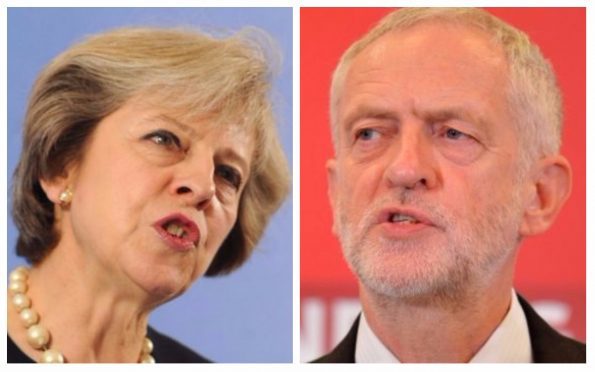Theresa May and Jeremy Corbyn have faced off against one of their toughest election challenges yet in a televised interview and answers session dubbed the ‘Battle for Number 10’.
The Labour leader came off the better of the two, giving a more assured performance during the audience question and answer section and looking confident in an awkward interview exchange with veteran broadcaster Jeremy Paxman.
Mrs May, at times, appeared to crack under the pressure, visibly squirming when heckled by members of the audience over her record on school funding, education and the health service.
During the live question and answer section, the Prime Minister was confronted by a serving police officer about “devastating” cuts during her time as home secretary.
But Mrs May did not provide an answer to a request from the officer, whose name was given as Martin, for a specific number of additional officers which she would recruit if re-elected in the June 8 general election.
She acknowledged that numbers of police in England and Wales had fallen by around 20,000 but added: “What we had to do when we came into government in 2010 was to ensure that we were living within our means and that was very important because of the economic situation we had inherited.
“It’s not just about the numbers of police – people often focus on the numbers of police. It’s actually about what the police are able to do and how they are being deployed on our streets.”
Is Theresa May “a blowhard who collapses at the first sign of gunfire”? #BattleForNumber10 pic.twitter.com/MNgsWD5rgE
— Sky News (@SkyNews) May 29, 2017
The Prime Minister argued that counter-terrorism budgets had been protected and said more money was being used to target new threats such as cyber-crime.
“A government has to ensure that we are keeping abreast with the changes that take place, with the challenges out there that we need to deal with,” she added.
Martin responded: “I appreciate you are protecting the budgets, but we still need the staff to carry out the role of the police officer of keeping the public safe.”
Mrs May was also pressed about the Conservative Party’s social care plans, dubbed the “dementia tax”, with one elderly audience member asking: “Why should we in my generation vote for you?”
The PM said the UK faces the challenge of an ageing society, adding about her party’s proposals: “It’s about ensuring that nobody is going to have to sell their house to pay for care in their lifetime.
“It’s about ensuring that £100,000 of savings and assets are protected to pass on to their family.
“We will put an absolute cap on the level of money that people have to spend on care.”
Mrs May also repeated her “no deal is better than a bad deal” slogan when asked if she was prepared to walk away from Brexit talks.
Mr Paxman said: “So you are prepared to walk away?”
Mrs May replied: “I think you have to. In negotiations you have to recognise that you’re not in there to get a deal at any price.
“We’re in there to get the best deal for the United Kingdom, and actually I’m optimistic about that because I think in the European Union they want to continue their relationship with us as well.”
Mr Corbyn meanwhile, insisted he would not “soften” Britain’s foreign policy if he becomes prime minister, after Conservative claims he would be soft on terrorism.
Challenged over whether he would “soften” the UK’s foreign policy, he said: “It’s not about softening our foreign policy. It’s about absolutely condemning what happened in Manchester.”
He added: “We have to have a foreign policy around the world that doesn’t leave large areas without any effective government – such as in Libya at the present time – which can become a breeding ground for enormous danger for all of us.
We will deliver a profound change in our society.
Britain, under a Labour government, will work #ForTheMany. #BattleForNumber10 pic.twitter.com/k1Yzn3Kx0R
— Jeremy Corbyn (@jeremycorbyn) May 29, 2017
“My point was absolute condemnation. My point was that we need more police not less – that’s why we’ve pledged to provide 10,000 more police on our streets – and we need a foreign policy that doesn’t leave large areas of the world ungoverned so that we have a more secure future for all of us.”
Mr Corbyn was told he had made it “impossible” for one audience member to vote Labour due to his “ruthless, short-sighted” policies including raising corporation tax to 26%, a £10 an hour minimum wage and imposing VAT on private school fees.
The Labour leader said of his corporation tax policy: “This country is badly divided between the richest and the poorest. You put corporate tax and tax at the top end down, the division gets greater.
“Are you happy that so many of our children are going to school with super-sized classes, so many of our children are going to school hungry?
“Are you happy there are so many people waiting for hospital operations, a million waiting for social care?
“You don’t address these problems by ignoring them.”
He appealed to the voter to recognise “we are all better off, when everybody is better off”.
